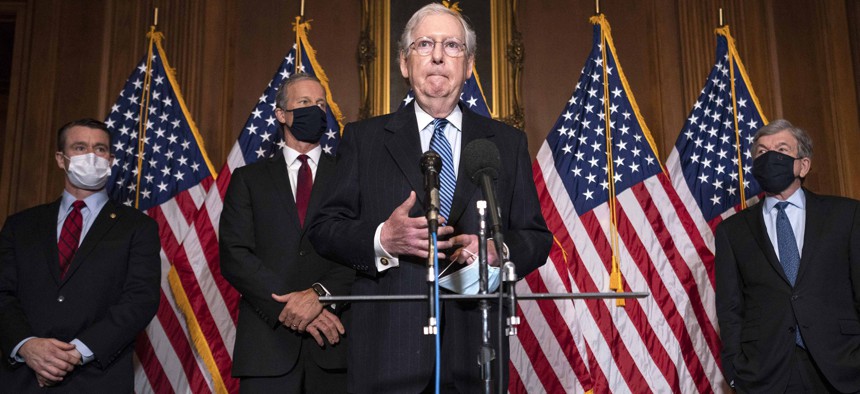McConnell: State and Local Aid Should Be Left Out of Near-Term Virus Relief Deal

Senate Majority Leader Mitch McConnell of Kentucky, speaks to the media after the Republican's weekly Senate luncheon, Tuesday, Dec. 8, 2020 at the Capitol in Washington. Kevin Dietsch/Pool via AP
The Senate majority leader recommended passing a package with programs that Democrats and Republicans can agree on, while the Trump administration offered its own proposal.
Senate Majority Leader Mitch McConnell on Tuesday said Democratic and Republican lawmakers should set aside discussions about providing states and local governments with more federal aid to help them deal with the fallout from the coronavirus and instead focus on passing a virus relief package before year-end that includes items the two parties can agree on.
McConnell also said he’s willing to leave provisions out of the possible near-term deal that he supports, particularly providing liability shields to businesses and other organizations from coronavirus-related lawsuits. Like the idea of helping states and localities, he acknowledged that proposal is politically contentious.
“We know the new administration’s going to be asking for another package,” he said. “What I recommend is we set aside liability and set aside state and local and pass those things that we can agree on. Knowing full well we’ll be back at this after the first of the year.”
“We have some very serious questions about the actual need of additional state and local assistance,” McConnell added.
The majority leader also indicated that reaching a deal on coronavirus assistance legislation of some sort before Congress wraps up its work for the year is a must. “Leaving here without a Covid relief package cannot happen,” he said. “We have to get that done.”
Asked by reporters about McConnell's offer, Senate Minority Leader Chuck Schumer countered that there is “bipartisan” support for extending more help to states and local governments, and added that the same isn’t true of legal protections for businesses. "State and local funding is bipartisan unlike the extreme corporate liability proposal Leader McConnell made, which has no Democratic support,” Schumer said, according to Politico.
Meanwhile, Treasury Secretary Steven Mnuchin said in a statement on Tuesday evening that he spoke with House Speaker Nancy Pelosi around 5 p.m. and, on behalf of President Trump, presented a $916 billion proposal with money for state and local governments and "robust liability protections" for businesses, schools and universities.
This all comes on the heels of a bipartisan group of lawmakers last week releasing a $908 billion framework for another round of coronavirus relief that included $160 billion in state, local and tribal aid. That plan also proposed a $45 billion pot of funding for transit, as well as other transportation, including airlines and rail.
Senate Majority Whip John Thune, a Republican from South Dakota, suggested there are a range of programs apart from state and local aid and the liability provisions that have broad support and that could be included in a bill passed before the end of the year—including federal support for getting people vaccinated against the virus, assisting small businesses and extending certain unemployment benefits.
“I think we could get a deal,” said Thune, adding that such a package could be tied to end-of-year spending legislation lawmakers must pass to avoid a government shutdown.
Thune, too, voiced skepticism about the need for the federal government to funnel more money to states and localities.
“I would argue,” he said, “there are lots of states around the country that are in a pretty good condition, fiscally, right now. Mine would be one of those.” Many Senate Republicans, he added, “have big reservations about borrowing money to basically bail out a few states who maybe because of their own actions are in a bad fiscal situation.”
Coronavirus relief legislation known as the CARES Act that lawmakers approved back in March included a $150 billion fund designed to assist state and local governments, along with territories and tribes. But many state and local leaders have argued that states, cities and counties need more help, and some have also complained that rules for how the earlier funding can be used are too rigid.
McConnell referred to this earlier funding in his remarks on Tuesday. “A lot of members on our side look at the various states that received the $150 billion we did in the CARES Act and wonder if there’s a demonstrable need” for further state and local assistance, he said.
Bill Lucia is a senior reporter for Route Fifty and is based in Olympia, Washington.
NEXT STORY: States Overpaid Millions in Unemployment and Now Demand People Pay It Back






